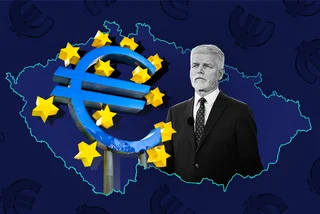The euro is becoming increasingly popular in Czech society. More people are depositing the euro, and banks are bumping up their interest rates to tempt consumers. The government has also made it legal for some workers to be paid in euros from next year, and one major Czech bank has become the third in the country to launch instant payments in the shared currency.
Salaries in euros from 2025
Recent changes to the Czech Labor Code mean that part of the Czech workforce can be paid in euros from next year – this is especially relevant for foreigners or those who have links to a foreign country. Those who work abroad but for a Czech company, live near the border to a different country, are cross-border workers, have family abroad, or have “demonstrable ties to a foreign country” will have the option to be paid in the common currency.
PARTNER ARTICLE
According to Ministry of Industry spokesman Marek Vošahlík, the ability to be paid in euros will help companies retain quality employees, reduce unwelcome currency-conversion, costs, and simplify accounting. This will also make the Czech labor market more flexible and attractive.
Czech Chamber of Commerce spokesperson Miroslav Diro says that the change will be of particular interest to “a person with Czech nationality who has a foreign spouse with permanent residence outside the Czech Republic, or a person with a maintenance obligation towards a child or dependent person in another state.”
Minister of Labor Marian Jurečka said earlier this year that he had "higher ambitions" regarding wages and salaries in euros, and wanted to extend the option to most of the Czech workforce. However, he noted that the government did not allow this because this change may negatively affect the monetary policy of the Czech National Bank (ČNB).
In 2023, Czechia’s fiscal reform allowed all companies in Czechia to keep accounts (and pay tax) in euros, dollars, or pounds, rather than only in Czech crowns.
Higher interest rates
Major Czech banks have drastically bumped up their interest rates on term deposits for euros. UniCredit, for example, offers 3 percent interest per year for euro deposits, which have increased 25 percent year on year. Last September, this interest rate was just 0.01 percent.
Similar is true for Raiffeisenbank. "Volumes on euro term deposits have roughly tripled this year,” bank spokeswoman Tereza Kaiseršotová told Czech media outlet Seznam Zprávy. The bank now offers 2.5 percent on six-month deposits.
Term deposits in banks are a type of savings account where you agree to keep your money deposited for a specific period of time in exchange for a higher interest rate.
Creditas Bank says that term deposits have increased fivefold in the last 12 months; the bank offers a 2.8-percent interest rate on six-month deposits.
what banks offer
- Creditas Bank - 3 percent
- ČSOB - 1 percent
- Fio Bank - 0.06 percent
- Komerční banka - 0.01 percent
- Max banka - 3 percent
- Oberbank - 2.25 percent
- UniCredit - 3 percent
Interest rates on 12-month deposits; data valid as of May 27, 2024. Specific terms apply.
Despite offering no interest, Česká spořitelna has also seen an upsurge in euro deposits and new euro accounts "The growth of interest in foreign currency accounts is generally stable and increases around 18 percent year-on-year,” bank spokesman Filip Hrubý told Seznam Zprávy.
Chief economist of the Czech Banking Association Jakub Seidler confirms the gradual increase in euro deposits. He notes that for households, the growth has been at a double-digit rate over the past three years, with the total share rising from 2.3 percent to 3.3 percent. Currently, foreign currency deposits make up 11 percent of all deposits, with the majority being in euros and mostly held by non-residents.
According to Chief Economist and Director of Strategy of the Roklen Financial Group Pavel Peterka, the increasing interest surrounding the euro is also because it has become much easier for people to set up a euro account with domestic banks in recent years.
Looking ahead, Peterka told Seznam: "I expect an expansion of the portfolio of euro services offered on the domestic market, in part due to the growth of the role of digital technologies and fintech."
Instant payments in euros
Earlier this month, Fio Banka became the third bank in the Czech market to offer instant payments in euros (SEPA payments) amid heightened consumer interest. These payments are only possible to other banks – Czech or international – that also support instant payments.
Sending and receiving them is free, except for outgoing euro payments to countries outside the EU, for which the fee is CZK 200. Fio clients can send up to EUR 4,000 at a time.
So far, only Oberbank and J&T Banka have allowed instant SEPA payments. However, with the euro gaining more attention in Czechia, it is likely that more banks will offer the service.
What’s more is that the European Commission and European Council plan to make these immediate payments mandatory in order to accelerate euro transfers for individuals and businesses within the EU and European Economic Area.
Will Czechia accept the euro?
The current coalition government is split on euro adoption. Prime Minister Petr Fiala has long been skeptical of the single currency and has repeatedly ruled out starting euro accession talks until the country’s next general election (in late 2025). He says that the Czech economy is not yet ready for the euro.
On the other hand, Jurečka has promoted euro adoption and told the media last summer that Czechia would fulfill the Maastricht criteria (the conditions needed for adopting the euro) "by the end of the decade."
Other coalition parties such as the Mayors and Independents and the Pirates party have routinely backed the opening of euro accession talks. In his New Year’s speech, Petr Pavel also advocated for concrete steps towards adopting the euro, saying that the shared currency was the “logical future” for the country.
An earlier ČNB study pointed out the pros and cons of euro adoption for the Czech Republic. It said a big benefit would come from the country’s strong trade links with other EU countries. Risks include the economic differences between the Czech Republic and the EU as a whole, such as the unusually high proportion of industry in Czech national GDP.
Czechs are generally against joining the eurozone. An opinion poll released last spring shows that just 18 percent of respondents are in favor of the country using the euro.












 Reading time: 5 minutes
Reading time: 5 minutes 





























